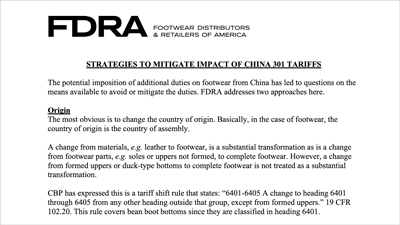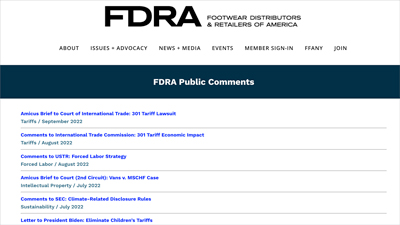Footwear Trade and Tax Update Center
Washington Update – Footwear & Politics
Miscellaneous Tariff Bill (MTB)
FDRA worked hard to file a number of Miscellaneous Tariff Bill (MTB) requests for temporary tariff relief for footwear, and more than 200 footwear MTB requests were filed during the 2019-2020 petition cycle. MTBs provide temporary tariff relief for products that are not available in the U.S. like certain chemicals, machinery, equipment, footwear, and apparel. The American Manufacturing Competitiveness Act, the law that establishes the new MTB process, states that imposing duties where there is no domestic availability or insufficient domestic availability negatively impacts both U.S. manufacturers and consumers. Footwear duties are some of the highest in the U.S. Tariff Code and are even higher on lower priced footwear. Temporarily reducing these duties through MTBs greatly benefits U.S. consumers with lower prices and increases the competitiveness of American footwear businesses. After vetting all of the MTB petitions, the U.S. International Trade Commission (ITC) released its final report to Congress in August 2020. In June 2021, the Senate introduced and passed MTB legislation, and House Democrats and House Republicans introduced their own versions of the MTB. FDRA will work to ensure that final MTB legislation is enacted as soon as possible.
MTB ADVOCACY
- Current MTBs
- Proposed MTBs
- MTB Comparison Document: House vs. Senate
- Senate MTB Bill (in Senate-passed China Bill)
- House Democrat MTB Bill
- House Republican MTB Bill
- MTB Petition System (More than 200 proposed footwear MTBs. System is searchable once users create user name and password)
Generalized System of Preferences (GSP)
FDRA has long advocated for expanding the current Generalized System of Preferences (GSP) to include footwear, so that companies that produce shoes in Cambodia, Indonesia and a number of other developing nations can utilize this important trade preference program. Created in the 1970s, GSP provides duty-free access for certain goods produced in more than 120 countries, with a strong focus on least developed countries. It benefits American families and individuals with greater choice and value on many basic consumer goods and remains key to helping lift individuals in developing nations out of poverty. Although the program does not include the two largest footwear-producing countries, China and Vietnam, expanding GSP to include footwear would increase opportunities for companies looking to diversify sourcing and generate significant duty savings for the industry. FDRA is currently working on an initiative that will reform and expand the program to cover footwear.
GSP DOCUMENTS
United States-Mexico-Canada Agreement (USMCA)
The USMCA was ratified by the Senate in January 2020. FDRA made the following statement, “The day after the United States and China signed a Phase One trade deal, the Senate ratified the United States-Mexico-Canada Agreement (USMCA). Unlike the China deal, however, the USMCA expands free trade and continues much-needed tariff relief for U.S. companies. The U.S. footwear industry applauds the passage of the USMCA and calls on the Trump Administration to increase its efforts to open markets around the world and lower duties for American shoe companies and our customers.” The USMCA did not impact Chapter 64, the footwear chapter. While NAFTA has played an important role over the years for many U.S. companies including manufacturers, the limitations it placed on footwear rules of origin have greatly inhibited the ability of the footwear sector to develop in North America. In fact, in 2019, NAFTA was utilized for only 0.2 percent of all pairs of shoes imported into the U.S. market. While it does not change these restrictive rules of origin, the USMCA is still important for the industry because it establishes rules for 21st century trade, intellectual property, environmental, and labor standards and will serve as a framework for future U.S. free trade agreements.
Administrative Action
FDRA has served as the voice of the footwear industry in the following administrative hearings and reviews:
- Special 301 Hearing: Each year, the Office of the United States Trade Representative (USTR) conducts an annual review of the state of intellectual property rights (IPR) protection and enforcement in markets all around the world. This report includes the designation of certain countries on a Watch List or Priority Watch List. On March 8, 2018, FDRA testified before an inter-agency and inter-Department Special 301 panel, highighting the need for greater footwear IP protection in markets of interest including China, Russia, and Brazil. This annual report is different than the ongoing Section 301 investigation into the challenges of protecting IPR in China.
- U.S. Import Restraints Hearing: President Obama’s United States Trade Representative Michael Froman initiated a special fact-finding investigation by the International Trade Commission (ITC) to assess the current economic impact of U.S. tariffs, customs procedures, and other import barriers. On February 9, 2017, FDRA testified before the ITC and stressed the need to reduce footwear duties and simplify Chapter 64 of the HTS. The final ITC report heavily references the positive impact of removing barriers to footwear trade based on FDRA’s input, referencing footwear an impressive 109 times in its report.
- Omnibus Report on U.S. Trade Deficits: President Trump issued an executive order in March 2017 that requires the Secretary of Commerce and USTR to issue a detailed report identifying countries with which the U.S. has a trade deficit in goods and to assess the major causes of these trade deficits. FDRA provided written comments to the Department of Commerce in May 2017.
- Federal Regulations on Domestic Manufacturing Report: President Trump issued a presidential memorandum in January 2017 directing the Commerce Department to determine federal regulations impacting domestic manufacturing and then prepare a report detailing a plan to reduce regulatory burdens for U.S. manufacturers. FDRA submitted comments to the Commerce Department on this issue in March 2017.
- Performance Reviews of All U.S. Trade Agreements: In an April executive order, President Trump directed the Secretary of Commerce and USTR to issue a report that provides comprehensive performance reviews of all U.S. free trade agreements, trade preference programs, and trade relations with WTO Members. FDRA provided written comments to the Administration in July 2017.
ADMINISTRATIVE ACTION DOCUMENTS
- Special 301 Hearing
- U.S. Import Restraint Hearing
- U.S. Trade Deficits Report
- Domestic Manufacturing Report
- Trade Performance Review







